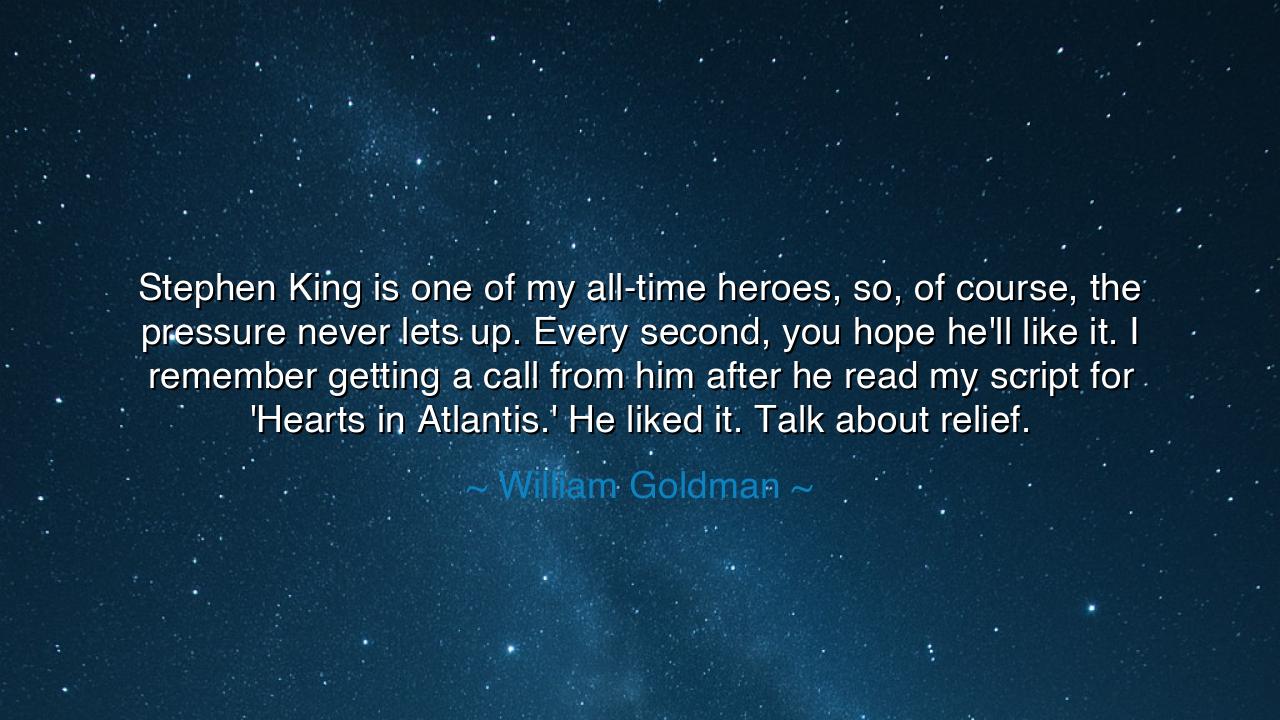
Stephen King is one of my all-time heroes, so, of course, the
Stephen King is one of my all-time heroes, so, of course, the pressure never lets up. Every second, you hope he'll like it. I remember getting a call from him after he read my script for 'Hearts in Atlantis.' He liked it. Talk about relief.






“Stephen King is one of my all-time heroes, so, of course, the pressure never lets up. Every second, you hope he'll like it. I remember getting a call from him after he read my script for Hearts in Atlantis. He liked it. Talk about relief.” — thus spoke William Goldman, the great weaver of stories, the man whose words carved both laughter and longing into the hearts of millions. Beneath the surface of this humble confession lies a timeless truth about admiration, fear, and creation — that even the mighty tremble before those they revere, and that the desire to be worthy in the eyes of one’s hero can drive a soul to its most inspired heights.
Goldman, the celebrated screenwriter of Butch Cassidy and the Sundance Kid and The Princess Bride, was himself a master of craft, yet in this moment he speaks not as a legend, but as a disciple. His words echo the eternal struggle of the artist — that strange mixture of confidence and doubt, of mastery and humility. For though he had earned the highest honors of his profession, when faced with the work of Stephen King, he felt again like the apprentice before the master. Such is the nature of reverence: it humbles even the accomplished, reminding them that there are still summits higher than their own.
In this reflection, Goldman unveils a lesson known to all who create — that pressure is not the enemy, but the forge in which greatness is tested. To labor under expectation, to feel the weight of admiration pressing down upon one’s craft, is to walk the edge of creation itself. “Every second, you hope he’ll like it,” Goldman says — not because he craves flattery, but because he wishes to honor what inspired him. The artist’s truest desire is not to outshine his hero, but to earn his respect, to add one small flame to the fire that first lit his own imagination.
The ancients understood this sacred tension well. When Aristotle wrote his treatises, he stood in the shadow of Plato, and yet it was in wrestling with his teacher’s ideas that he forged his own. When Michelangelo painted the ceiling of the Sistine Chapel, he worked not to surpass his predecessors, but to prove himself worthy of the divine spark they had kindled. Likewise, Goldman’s labor beneath King’s gaze becomes a reflection of this ancient rhythm: the student striving before the master, trembling but determined, carrying forward the lineage of creation that stretches back through all time.
And then comes the moment of relief — that blessed instant when the master’s voice, instead of condemnation, brings approval. “He liked it,” Goldman recalls, his words simple yet luminous with gratitude. In those three words lies the collapse of tension, the release of long-held breath. For those who dare to create, validation from the one who inspired them is not mere praise — it is initiation. It is the passage from disciple to peer, from hope to fulfillment. It is the soul’s quiet whisper: “You have done well.”
Yet Goldman’s story carries another truth: that even the great remain human, forever bound by the need for connection and affirmation. No achievement silences the heart’s longing to be seen by those it admires. The hero’s shadow never disappears, but it need not bring despair. Instead, it reminds us that humility is the companion of mastery, and that reverence keeps the soul alive, guarding it against arrogance and complacency. For it is better to create in awe than to create in pride; better to tremble in respect than to harden in vanity.
So, my child, let this be the lesson: never lose the fear that comes with loving something deeply. Whether you paint, write, build, or dream, let the presence of your heroes press upon you, not as a burden, but as a blessing. Let their greatness ignite, not intimidate. For to stand in the shadow of those you admire is to be guided by their light. And when, at last, the day comes when they look upon your work and smile — or even when they never see it at all — know that the striving itself was holy.
For as William Goldman reminds us, even the masters are still students before their heroes. The pressure never ends, because creation itself never ends. It is the sacred tension between love and fear, reverence and courage, that keeps the artist’s heart alive. So, labor with trembling hands, speak your truth with humility, and seek not perfection, but authenticity. For in that striving — in that trembling hope that what you create will honor what you love — you will find not only relief, but the joy of being part of the endless story of human creation.






AAdministratorAdministrator
Welcome, honored guests. Please leave a comment, we will respond soon